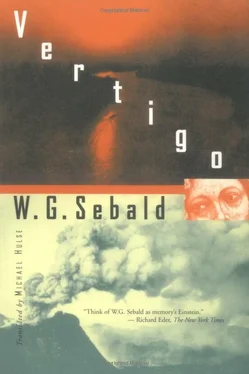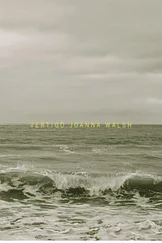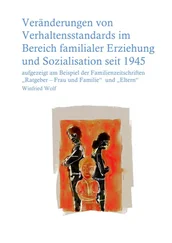Winfried Sebald - Vertigo
Здесь есть возможность читать онлайн «Winfried Sebald - Vertigo» весь текст электронной книги совершенно бесплатно (целиком полную версию без сокращений). В некоторых случаях можно слушать аудио, скачать через торрент в формате fb2 и присутствует краткое содержание. Год выпуска: 2001, ISBN: 2001, Издательство: New Directions, Жанр: Современная проза, на английском языке. Описание произведения, (предисловие) а так же отзывы посетителей доступны на портале библиотеки ЛибКат.
- Название:Vertigo
- Автор:
- Издательство:New Directions
- Жанр:
- Год:2001
- ISBN:978-0811214858
- Рейтинг книги:4 / 5. Голосов: 1
-
Избранное:Добавить в избранное
- Отзывы:
-
Ваша оценка:
- 80
- 1
- 2
- 3
- 4
- 5
Vertigo: краткое содержание, описание и аннотация
Предлагаем к чтению аннотацию, описание, краткое содержание или предисловие (зависит от того, что написал сам автор книги «Vertigo»). Если вы не нашли необходимую информацию о книге — напишите в комментариях, мы постараемся отыскать её.
Vertigo
The Emigrants
The Rings of Saturn
The New York Times Book Review
The Emigrants
Vertigo — читать онлайн бесплатно полную книгу (весь текст) целиком
Ниже представлен текст книги, разбитый по страницам. Система сохранения места последней прочитанной страницы, позволяет с удобством читать онлайн бесплатно книгу «Vertigo», без необходимости каждый раз заново искать на чём Вы остановились. Поставьте закладку, и сможете в любой момент перейти на страницу, на которой закончили чтение.
Интервал:
Закладка:
We finally reached Klosterneuburg by way of Albrecht-strasse at the upper end of which there is a gruesome building banged together out of breezeblocks and prefab panels. The ground-floor windows are boarded up. Where the roof should be, only a rusty array of iron bars protrude into the sky. Looking at it was like witnessing a hideous crime. Ernst put his best foot forward, averting his eyes from this fearful monument. A little further on, the children inside the primary school were singing, the most appealing sounds coming from those who could not quite manage to hit the right notes. Ernst stood still, turned to me as though we were both actors on a stage, and in a theatrical manner uttered a statement which appeared to me as if he had committed it to memory a long time ago: That is a very fine sound, borne upon the air, and uplifts one's heart. Some two years previously I had stood once before outside that school. I had gone to Klosterneuburg with Clara to visit her grandmother, who had been taken into the old people's home in Martinsstrasse. On the way back we went down Albrechtstrasse and Clara gave in to the temptation to visit the school she had attended as a child. In one of the classrooms, the very one where she had been taught in the early 1950s, the selfsame schoolmistress was still teaching, almost thirty years later, her voice quite unchanged — still warning the children to keep at their work, as she had done then, and also not to chatter. Alone in the entrance hall, surrounded by closed doors that had seemed at one time like mighty portals, Clara was overcome by tears, as she later told me. At all events, when she came out she was in such a state of distress as I had never seen her in before. We returned to her grandmother's flat in Ottakring, and neither on the way there nor that entire evening did she regain her composure following this unexpected encounter with her past.
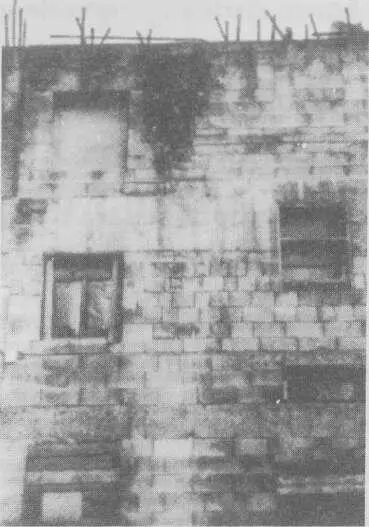
The St Martin's home is a large, rectangular building with massive stone walls dating from the seventeenth or eighteenth century. Clara's grandmother, Anna Goldsteiner, who was afflicted with that extreme kind of forgetfulness which soon renders even the simplest of everyday tasks impossible to perform, shared a dormitory on the fourth floor. Through the barred, deeply recessed windows there was a view down onto the tops of the trees on the steeply sloping ground to the rear of the house. It was like looking upon a heaving sea. The mainland, it seemed to me, had already sunk below the horizon. A foghorn droned. Further and further out the ship plied its passage upon the waters. From the engine room came the steady throb of the turbines. Out in the corridor, stray passengers went past, some of them on the arm of a nurse. It took an eternity, on these slow-motion walks, for them to cross from one side of the doorway to the other. How strange it is, to be standing leaning against the current of time. The parquet floor shifted beneath my feet. A low murmuring, rustling, dragging, praying and moaning filled the room. Clara was sitting beside her grandmother, stroking her hand. The semolina was doled out. The foghorn sounded again. A little way further out in the green and hilly water landscape, another steamer passed. On the bridge, his legs astride and the ribbons on his cap flying, stood a mariner, signalling in semaphore with two colourful flags. Clara held her grandmother close as they parted, and promised to come again soon. But barely three weeks later Anna Goldsteiner, who in the end, to her own amazement, could no longer even remember the names of the three husbands she had survived, died of a slight cold. At times it does not take much. For weeks after we learned of her death I could not put out of my mind the blue, half-empty pack of Bad Ischi salt under the sink in her council flat in Lorenz Mandi Gasse and which she would never now be able to use up.
Footsore from our walk, Ernst and I emerged from Albrechtstrasse onto the town square, which sloped slightly to one side. For a while we stood irresolute on the curb in the dazzling midday sun before trying, like two strangers, to cross the road amid the infernal traffic, almost being run down by a gravel truck. Once we were on the shady side of the street we dived into a bar. At first the dark that enveloped us as we entered was so impenetrable for eyes accustomed to the glare outside that we were obliged to sit down at the first table we came to. Only gradually and partially did our sight return and other people become apparent in the gloom, some of them bent low over their plates, others sitting curiously upright or leaning back, but all of them without exception on their own, a silent gathering, the shadow of the waitress threading among them, as if she were the bearer of secret messages between the several guests and the corpulent landlord. Ernst declined to eat anything, and instead took one of the cigarettes I offered him. A time or two he appreciatively turned the packet with its English wording in his hands. He inhaled the smoke deeply, with the air of a connoisseur. The cigarette, he had written in one of his poems, is a monopoly and must be smoked. So that it goes up in flames.
And, putting down his beer glass after taking a first draught, he observed that he had dreamed about English Boy Scouts last night. What I then told him about England, about the county in East Anglia where I live, the great wheatfields which in the autumn are transformed into a barren brown expanse stretching further than the eye can see, the rivers up which the incoming tide drives the sea water, and the times when the land is flooded and one can cross the fields in boats, as the Egyptians once did — all of this Ernst listened to with the patient lack of interest of a man who has long been familiar with every detail he is being told. I then asked if he would write something in my notebook, and this he did without the slightest hesitation with the ballpoint which he took from his jacket pocket, resting his left hand on the open page. His head to one side, his brow furrowed in concentration, his eyelids half-closed, he wrote:
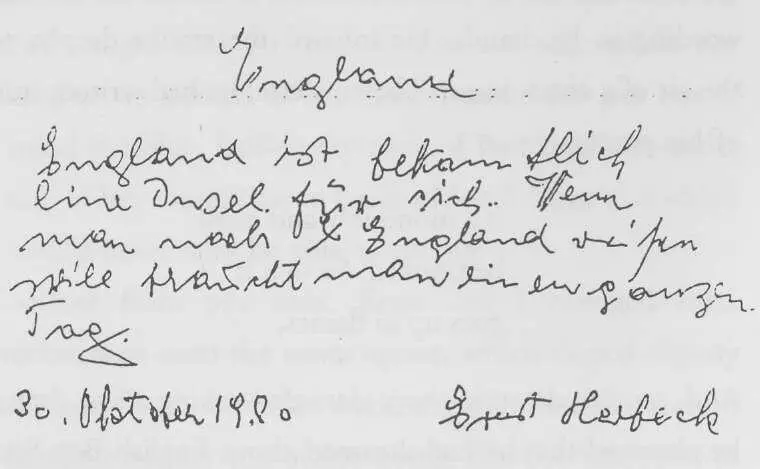
England. England, as is well known, is an island unto itself. Travelling to England takes an entire day. 30 October 1980. Ernst Herbeck. — We left. It was not far now to the St Agnes home. When we parted, Ernst, standing on tiptoe and bowing slightly, took his hat from his head and with it, as he turned away, executed a sweeping motion which ended with him putting the hat back on; a performance which seemed to be, at the same time, both childishly easy and an astonishing feat of artistry. This gesture, like the manner in which he had greeted me that morning, put me in mind of someone who had travelled with a circus for many years.
The train journey from Vienna to Venice has left scarcely any trace in my memory. For what may have been an hour I watched the lights of the southwestern metropolitan sprawl pass by, till at length, lulled by the speed of the train, which was like an analgesic after the never-ending tramping through Vienna, I fell asleep. And it was in that sleep, with everything outside long since plunged into darkness, that I beheld a landscape that I have never forgotten. The lower portion of the scene was almost immersed in the approaching night. A woman was pushing a pram along a field track towards a group of buildings, on one of which, a dilapidated pub, the name Josef Jelinek was painted in large letters over the gabled entrance. Mountains dark with forests rose above the rooftops, the jagged black summits silhouetted against the evening light. Higher than them all, though, was the tip of the Schneeberg, glowing, translucent, throwing out fire and sparks, towering into the dying brightness of a sky across which the strangest of greyish-pink cloud formations were moving, while visible between them were the winter planets and a crescent moon. In my dream I was in no doubt that the volcano was the Schneeberg, any more than I doubted that the countryside, above which I presently rose through a glittering shower of rain, was Argentina, an infinitely vast and deep green pastureland with clumps of trees and countless herds of horses. I awoke only as the train, which for so long had been threading the valleys at a steady pace, was racing out of the mountains and down to the plains below. I pulled down the window. Swathes of mist were ripping past me. We were hurtling onwards at breakneck speed. Pointed wedges of blue-black rock thrust up against the train. I leaned out and looked upwards, trying in vain to make out the tops of the fearful formations. Dark, narrow, ragged valleys opened up, mountain streams and waterfalls threw up white spray in a night on the edge of dawn, so close that their cold breath against my face made me shiver. It occurred to me that this was the Friaul, and with that thought came naturally the memory of the destruction which that region had suffered some few months before. Gradually the daybreak revealed landslides, great boulders, collapsed buildings, mounds of rubble and piles of stones, and here and there encampments of people living in tents. Scarcely a light was burning anywhere in the entire area. The low-lying cloud drifting in from the Alpine valleys and across that desolated country was conjoined in my mind's eye with a Tiepolo painting which I have often looked at for hours. It shows the plague-ravaged town of Este on the plain, seemingly unscathed. In the background are mountains, and a smoking summit. The light diffused through the picture seems to have been painted as if through a veil of ash. One could almost suppose it was this light that drove the people out of the town into the open fields, where, after reeling about for some time, they were finally laid low by the scourge they carried within them. In the centre foreground of the painting lies a mother dead of the plague, her child still alive in her arms. Kneeling to the left is St Thecla, interceding for the inhabitants of the town, her face upturned to where the heavenly hosts are traversing the aether. Holy Thecla, pray for us, that we may be safely delivered from all contagion and sudden death and most mercifully saved from perdition. Amen.
Читать дальшеИнтервал:
Закладка:
Похожие книги на «Vertigo»
Представляем Вашему вниманию похожие книги на «Vertigo» списком для выбора. Мы отобрали схожую по названию и смыслу литературу в надежде предоставить читателям больше вариантов отыскать новые, интересные, ещё непрочитанные произведения.
Обсуждение, отзывы о книге «Vertigo» и просто собственные мнения читателей. Оставьте ваши комментарии, напишите, что Вы думаете о произведении, его смысле или главных героях. Укажите что конкретно понравилось, а что нет, и почему Вы так считаете.
